Binance Coin (BNB) is one of the most popular and valuable cryptocurrencies, and many investors are looking for places to stake it and earn interest. There are many factors to consider, including rewards, fees, and ease of use. At Marketplace Fairness we have done the research and compiled a list of the best places to stake BNB, to save you time.
Best Places to Stake BNB in 2024
- Binance - Best place to stake BNB
- Crypto.com - Easiest way to stake BNB
- KuCoin - Promotions with high rewards when staking BNB
- Bybit - Best for BNB liquidity mining
#1. Binance - Best place to stake BNB
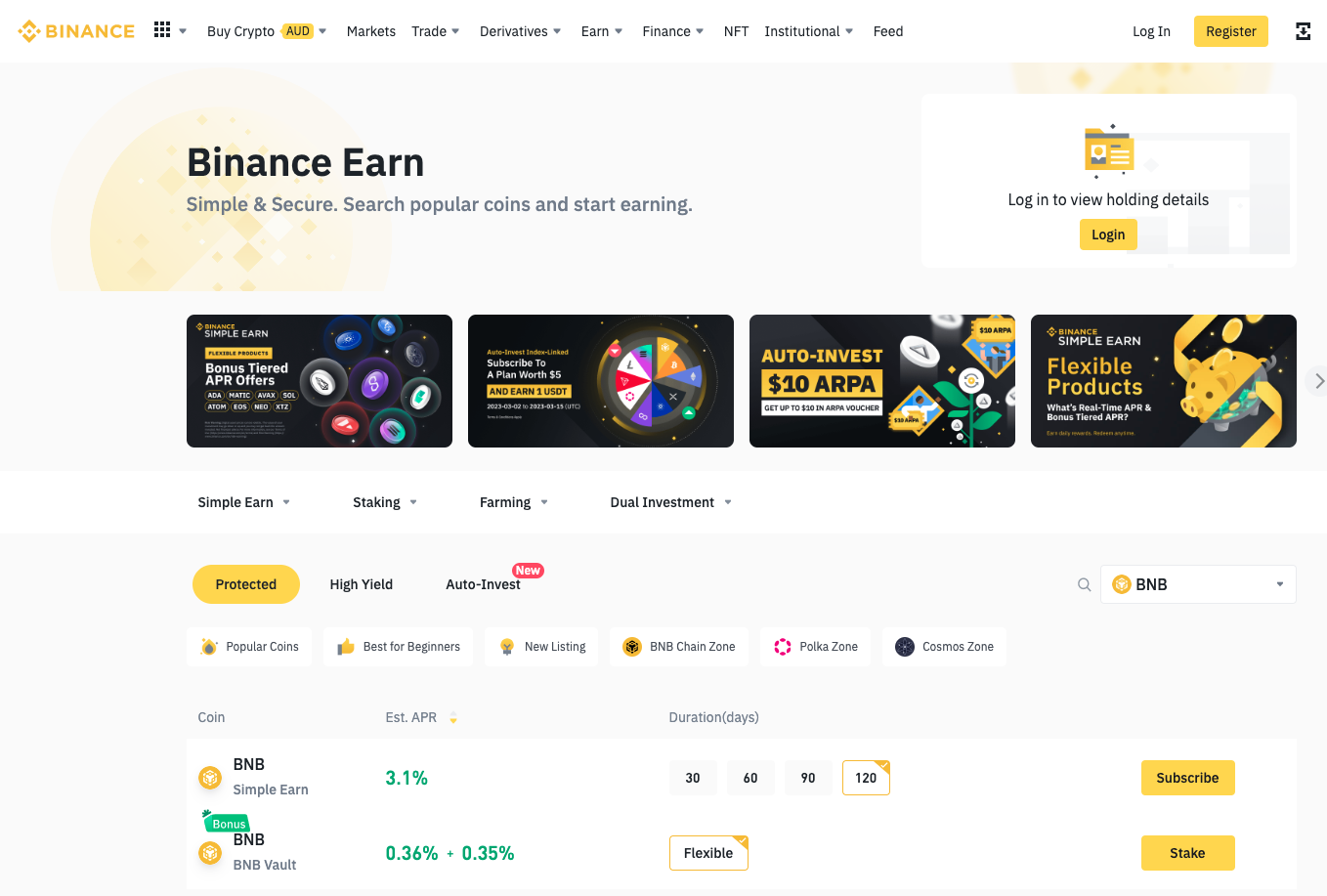
Binance is the the world's largest cryptocurrency exchange based on trading volume, and is the home of Binance Coin (BNB). It is simple to buy BNB on Binance and then stake it by navigating to the Earn section. The rewards are only 0.36% APY (+ bonus 0.35% APY at the time of writing) for flexible staking, but if you lock your BNB for an extended duration you will receive much higher rates.
When you lock for 30 days, the rewards are 2.2% APY, for 60 days it is 2.5% APY, for 90 days you receive 2.7% APY, and if you lock for 120 days, you earn the maximum 3.1% APY.
The main issue with Binance is that it isn't supported in the US. If you are a US resident, you will need to choose another exchange to stake your BNB, and we suggest our #2 option, Crypto.com.
#2. Crypto.com - Easiest way to stake BNB
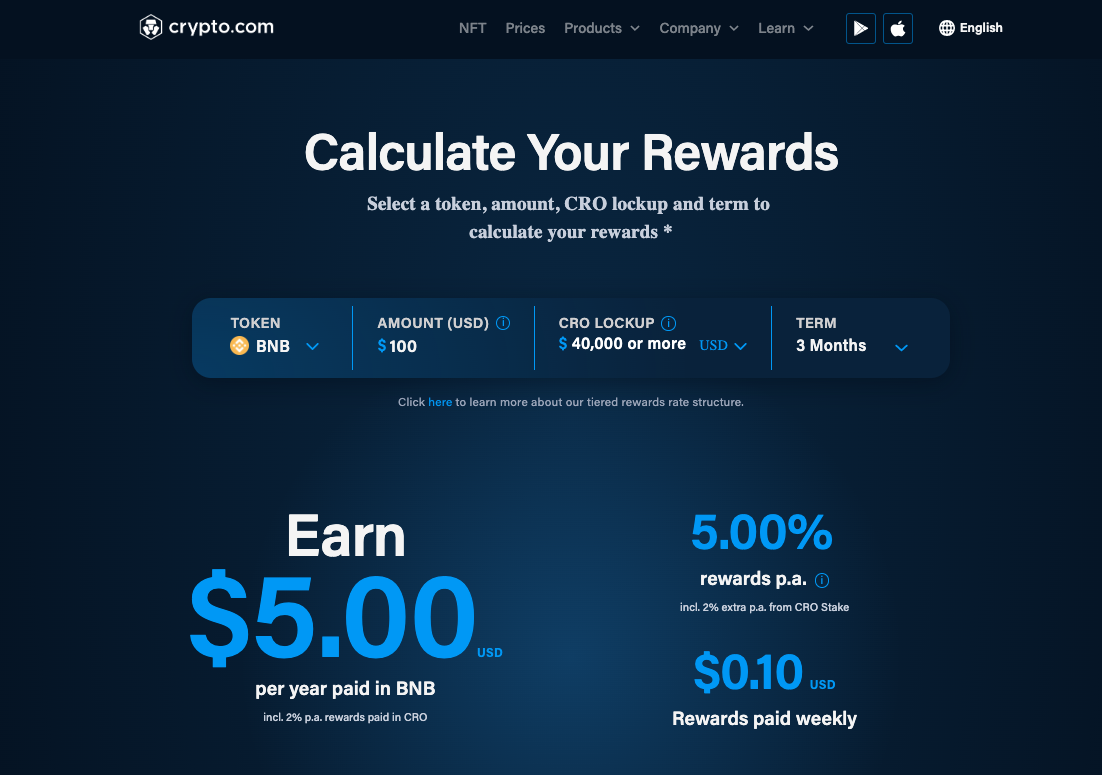
Crypto.com is one of the most well-known crypto apps, and is our top recommendation for beginners to staking BNB. The app is very simple to use, you can buy Binance Coin (BNB) directly using your credit/debit card, and then click 'Earn' to stake your BNB. It is also our #1 choice for US citizens, since they are not able to access Binance.
When you stake BNB on Crypto.com, the rewards will depend on whether you keep your crypto locked for 3 months, 1 month, or flexible. If you choose to leave your BNB flexible, the rewards are very low at only 0.1% APY. However if you lock it for 1 month, this increases to 1% APY and if you lock for 3 months, you earn 2% APY.
You can also increase the interest rates by staking Crypto.com's own coin, CRO. For example, if you stake $4,000 of CRO, and then stake BNB for 3 months, the rewards are now 3% APY. If you stake more than $40,000 of CRO, your rewards for staking BNB will reach 5% APY (when locked for 3 months).
Crypto.com is not suited for those who wish to stake large amounts, because the rewards decrease if you stake more than $3,000 of BNB. If you stake between $3,000 to $30,000 of BNB, the rewards are halved, and for any amount over $30,000 of BNB, the rewards are only 0.15x of the initial rate.
#3. KuCoin - High APY promotions when staking BNB
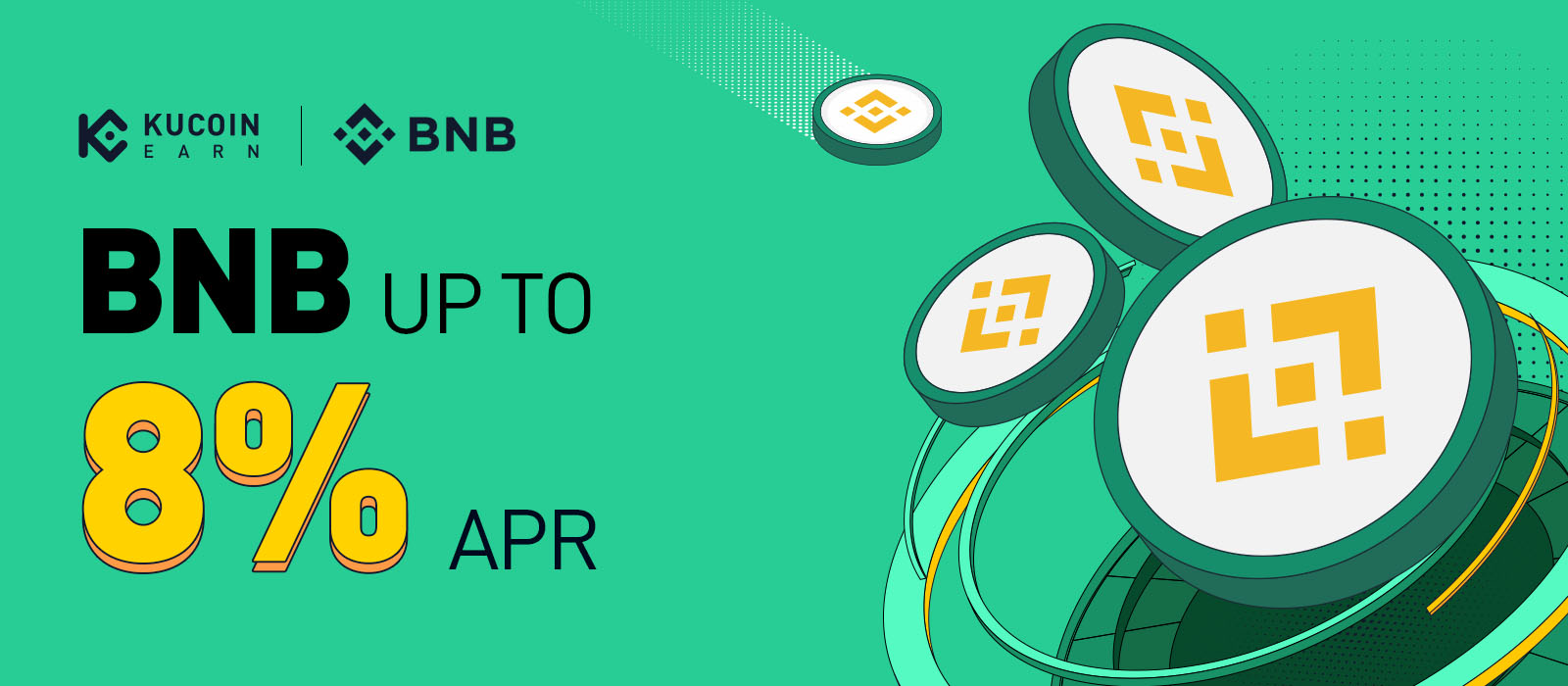
KuCoin is one of the largest crypto exchanges, with more than 20 million users, and they offer a massive range of 700+ coins. You can stake a huge number of cryptocurrencies on KuCoin, including BNB.
What makes KuCoin stand out from the others on this list is that they offer promotions with high rates. For example, at the time of writing, you can earn 8% APY on your BNB if you lock for 14 days, 3.5% APY when locked for 7 days, and 0.5% APY when keeping it flexible. The 8% APY option is the highest we have seen on any exchange, but this may not be around forever.
KuCoin also offers Dual Investment but this is risky, and your principal is not protected. If you have done research on the risks, and you are willing to try it out, the current rates are a huge 32.45% APY for BNB.
#4. Bybit - Best for BNB liquidity mining
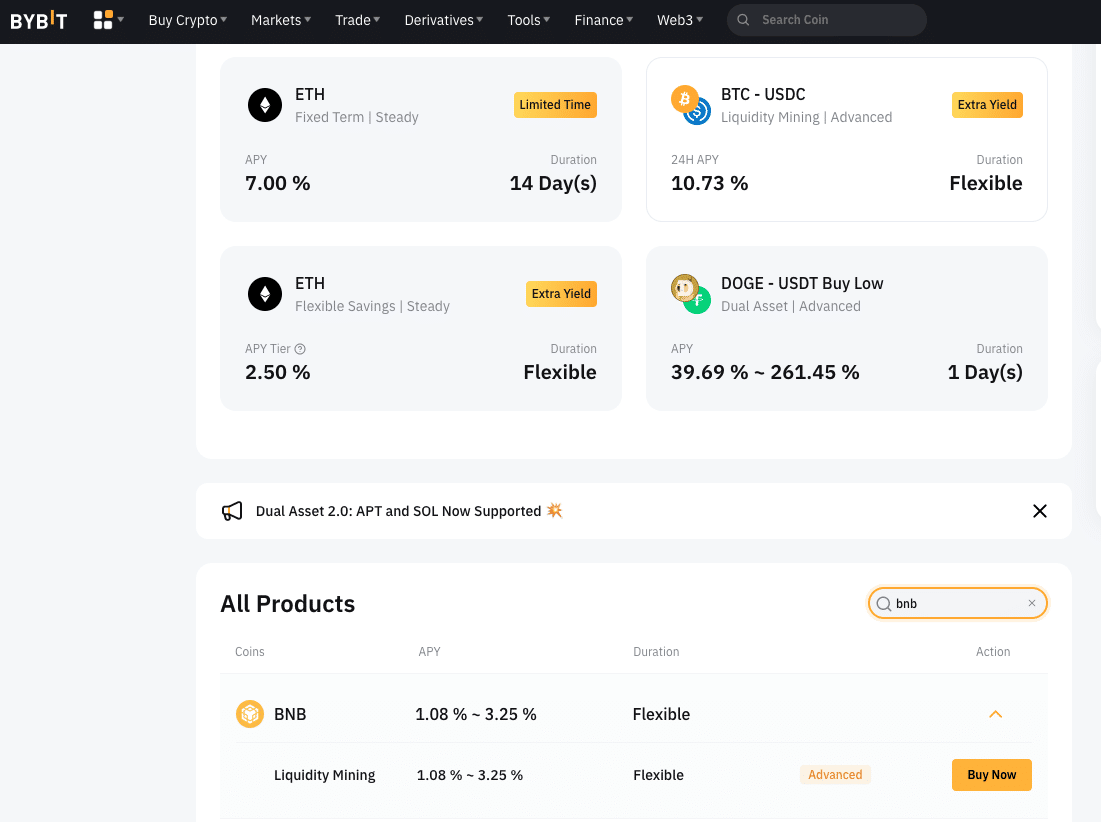
Bybit is one of our top exchanges for staking crypto, and it often offers high rates for flexible staking. We decided to see what the rates are for staking BNB and found that there are currently no options for flexible or fixed staking. However, they do offer liquidity mining instead, which is suitable for advanced crypto investors.
The rates are between 1.08% and 3.25% APY at the time of writing, which is higher than the other options when it comes to flexible staking. We don't recommend this to beginners, as it is more complex than simple staking that is found on other exchanges, like Binance and Crypto.com.
How do you stake BNB?
There are three ways to stake BNB: (1) using a crypto exchange, (2) using a cryptocurrency wallet, or (3) becoming a validator. Let's learn about each of these in more detail.
1. Use a Cryptocurrency Exchange
This is the simplest method, and is best for newcomers to staking BNB, as well as experienced investors who want to save time. The first step is to sign up using an exchange above. Then you can buy BNB (Binance Coin) directly using fiat currency. Navigate to the 'Earn' section, select the duration you wish to stake for, and then follow the prompts to finalise the process.
Use a Cryptocurrency Wallet
You can stake your BNB using a wallet such as Trust Wallet. It requires a couple of extra steps compared to using a crypto exchange. For example, on some wallets, you will not be able to purchase BNB directly, so you need to purchase it on a crypto exchange, and then transfer the coins to your wallet.
After you have BNB in your wallet, you can stake it, but it is not a simple process like on a crypto exchange. You will need to select validators first. Deciding on which validator will require some research, such as commission rates, voting power, and reward rate (APY). These factors influence how much you will earn when staking BNB.
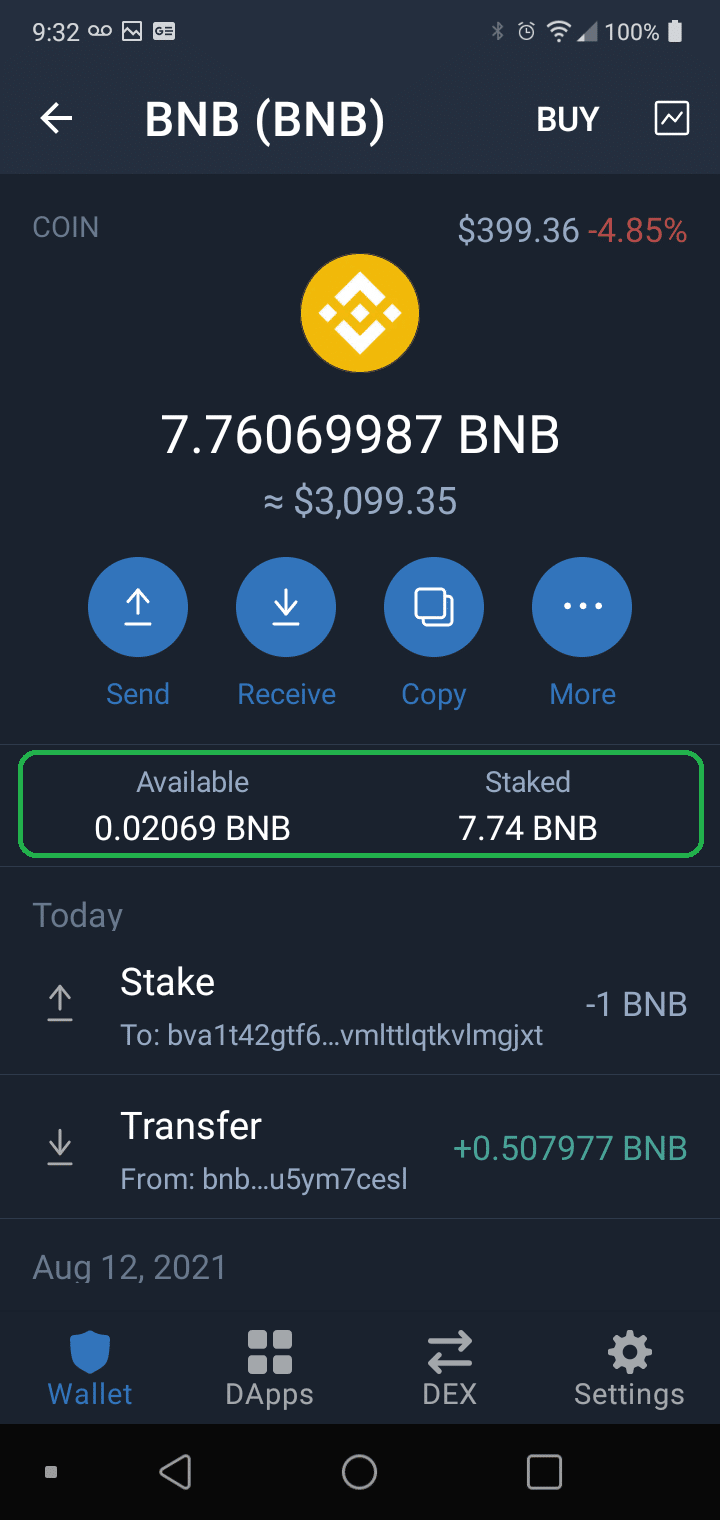
3. Become a Validator
This is the most complex way of staking BNB, and we don't recommend this unless you are highly experienced. Becoming a validator to stake BNB requires holding a certain amount of BNB, choosing a validator node, setting up your validator node, delegating your BNB, and earning rewards for validating transactions on the blockchain network. If you are interested in doing this, here are the steps:
- Hold BNB: In order to become a validator, you need to hold a certain amount of BNB which will vary depending on the blockchain network, but will usually range from hundreds to thousands of BNB. This is quite a large amount in terms of dollar value.
- Choose a validator node: A validator node is a server that runs software to validate transactions on the blockchain network. You can either set up your own validator node or use a third-party provider that offers staking services, eg: Ankr, Certik, or Staked.
- Set up your validator node: If you decide to set up your own validator node, follow the instructions provided by the blockchain network to set up the software on your server. This can be quite complicated, and it would be helpful to have some technical knowledge and experience in running a server.
- Delegate your BNB: Once your validator node is set up and running, you can delegate your BNB to your validator address. This means you entrust your coins to the validator node to participate in the staking process on your behalf. You can delegate your BNB using a Binance Chain-compatible wallet such as Trust Wallet or Ledger.
- Earn rewards: You will begin to earn rewards for validating transactions on the blockchain network. The amount of rewards you earn will vary based on how much BNB you have staked as well as the current staking rewards rate.
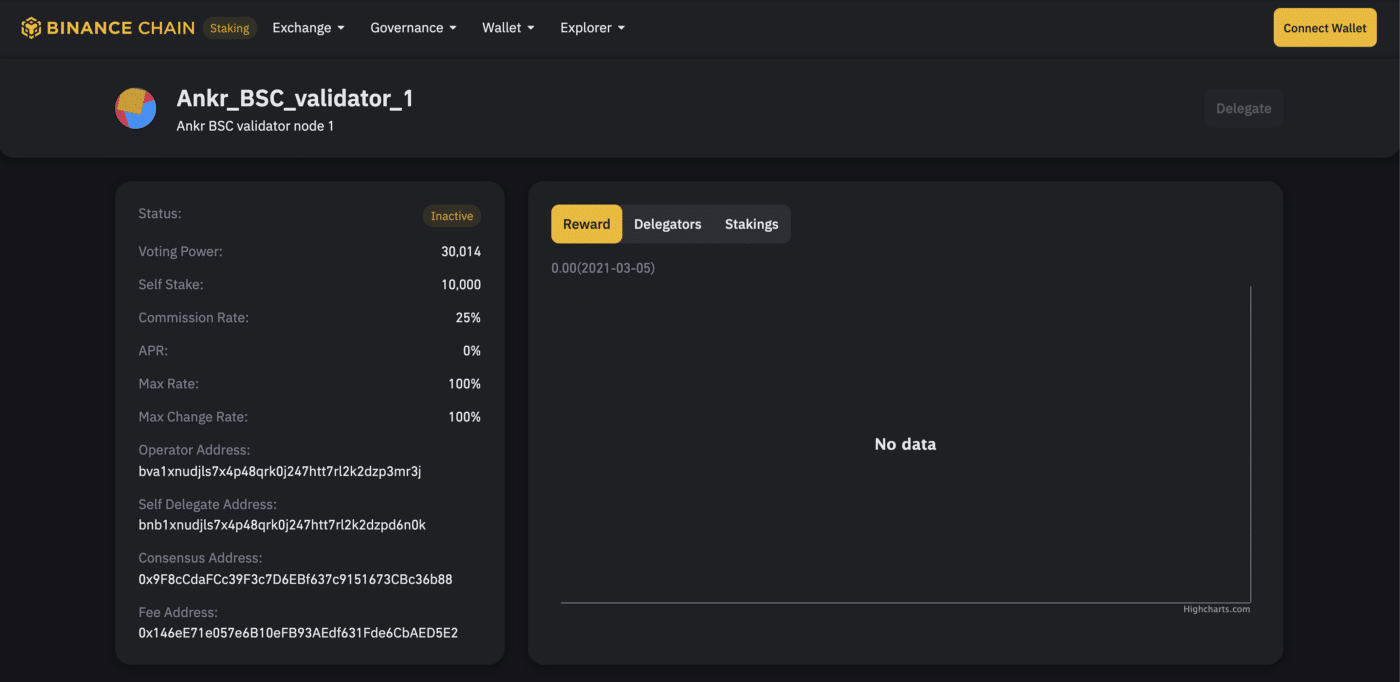
What is the best APY for staking BNB (Binance Coin)
The rewards you receive for staking BNB will depend on the exchange you choose, the duration of locked staking, as well as the current reward rates. At the time of writing you can earn up to 8% APY when staking BNB using KuCoin. Be sure to check out the current rewards at any exchange before staking, to ensure you earn the maximum rewards.
Conclusion
Whether you choose to stake BNB using a crypto exchange, crypto wallet, or becoming a validator is up to your personal preference. Ensure that whichever platform you choose, that you are selecting one that is secure, and offers high rewards. If you are want to stake other cryptocurrencies besides BNB, you can see our articles on where to stake ETH, SOL, SHIB, ALGO, AXS, DOT, ADA, and MATIC.

